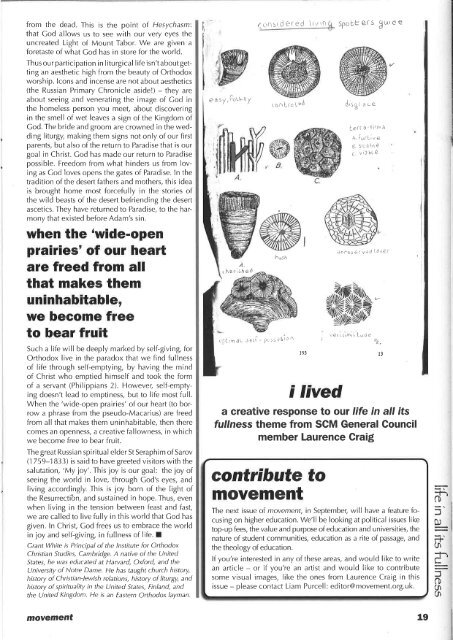Movement 123
Create successful ePaper yourself
Turn your PDF publications into a flip-book with our unique Google optimized e-Paper software.
from the dead. This is the point of Hesychasm:<br />
that God allows us to see with our very eyes the<br />
uncreated Light of Mount Tabor. We are given a<br />
foretaste of what Cod has in store for the world.<br />
Thus our participation i n I iturgical I ife isn't about getting<br />
an aesthetic high from the beauty of Orthodox<br />
worship. lcons and incense are not about aesthetics<br />
(the Russian Primary Chronicle aside!) - they are<br />
about seeing and venerating the image of Cod in<br />
the homeless person you meet, about discovering<br />
in the smell of wet leaves a sign of the Kingdom of<br />
God. The bride and groom are crowned in the wedding<br />
liturgy, making them signs not only of our first<br />
parents, but also of the return to Paradise that is our<br />
goal in Christ. Cod has made our return to Paradise<br />
possible. Freedom from what hinders us from loving<br />
as Cod loves opens the gates of Paradise. In the<br />
tradition of the desert fathers and mothers, this idea<br />
is brought home most forcefully in the stories of<br />
the wild beasts of the desert befriending the desert<br />
ascetics. They have returned to Paradise, to the harmony<br />
that existed before Adam's sin.<br />
when the 'wide-open<br />
prairies' of our heart<br />
are freed from all<br />
that makes them<br />
uninhabitable,<br />
we become free<br />
to bear fruit<br />
Such a life will be deeply marked by self-giving, for<br />
Orthodox live in the paradox that we find fullness<br />
of life through self-emptying, by having the mind<br />
of Christ who emptied himself and took the form<br />
of a servant (Philippians 2). However, self-emptying<br />
doesn't lead to emptiness, but to life most full.<br />
When the 'wide-open prairies' of our heart (to borrow<br />
a phrase from the pseudo-Macarius) are freed<br />
from all that makes them uninhabitable, then there<br />
comes an openness, a creative fallowness, in which<br />
we become free to bear fruit.<br />
The great Russian spiritual elder St Seraphim of Sarov<br />
(1759-1833) is said to have greeted visitors with the<br />
salutation, 'My joy'. This joy is our goal: the joy of<br />
seeing the world in love, through God's eyes, and<br />
living accordingly. This is joy born of the light of<br />
the Resurrectibn, and sustained in hope. Thus, even<br />
when living in the tension between feast and fast,<br />
we are called to live fully in this world that God has<br />
given. ln Christ, Cod frees us to embrace the world<br />
in joy and self-giving, in fullness of life. I<br />
CrantWhite is Principal of the lnstitute for Orthodox<br />
Christian Studies, Cambridge. A native of the United<br />
States, he was educated at Harvard, Oxford, and the<br />
tJniversity of Notre Dame. He has taught church history,<br />
history of Christian-Jewish relations, history of liturgy, and<br />
history of spirituality in the lJnited States, Finland, and<br />
the lJnited Kingdom. He is an Eastern Orthodox layman.<br />
W<br />
€asy,Cotksy<br />
W<br />
A.<br />
c hec,sh ed<br />
aoo srdered Itvrn<br />
to n L,ro Led<br />
ffi<br />
L<br />
hqsh<br />
cp.lim au seli- Pc':s<br />

















